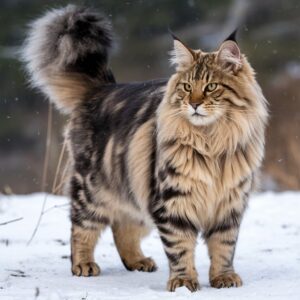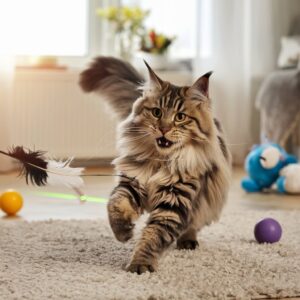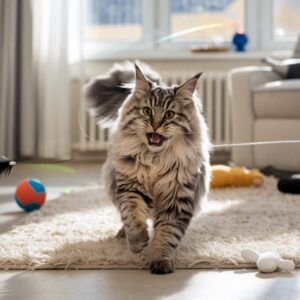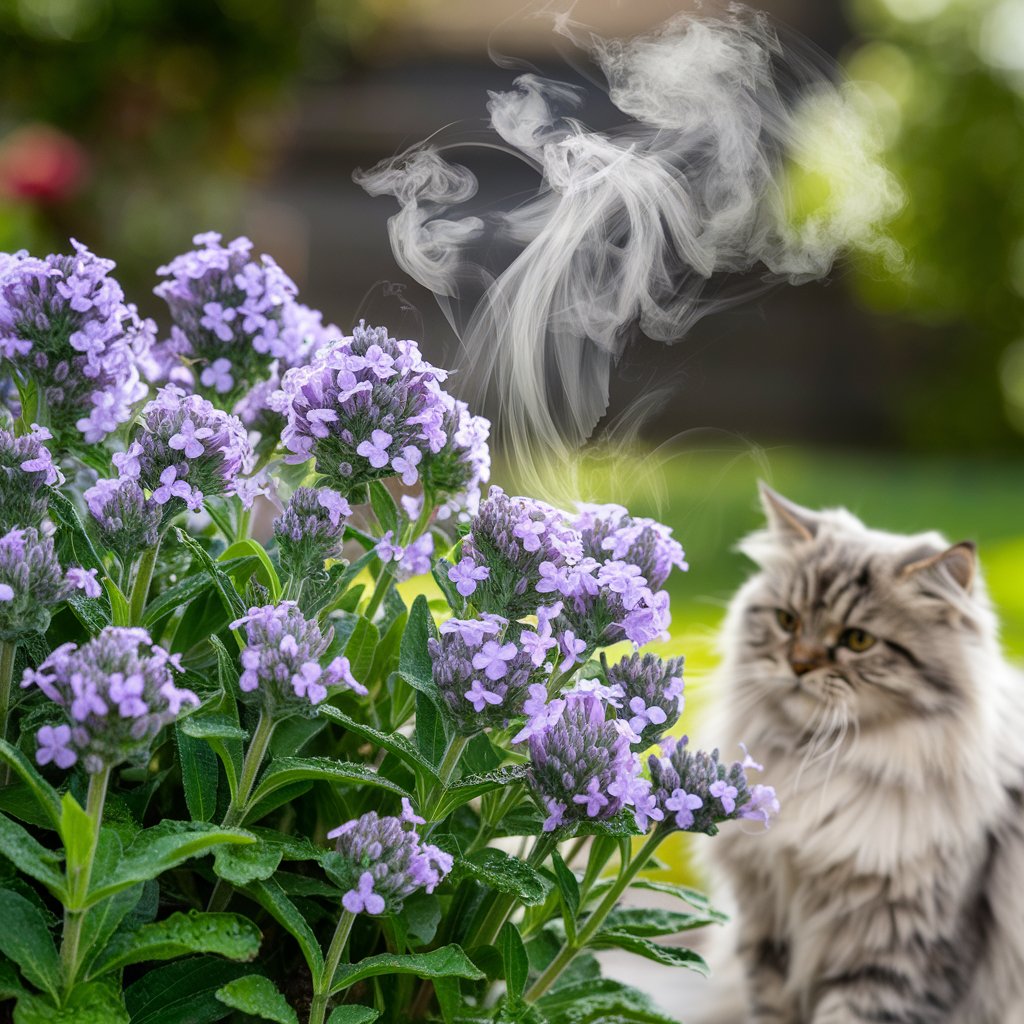Caring for Maine Coon Cats the Right Way
Contents
- 1 Proper Care for Maine Coon Cats
- 1.1 Key Takeaways
- 1.2 Nutrition and Diet for Maine Coon Cats
- 1.3 Grooming and Coat Care for Maine Coon Cats
- 1.4 Exercise and Play for Maine Coon Cats
- 1.5 Health Care and Veterinary Visits for Maine Coon Cats
- 1.6 Environmental Enrichment for Maine Coon Cats
- 1.7 Training and Socialization for Maine Coon Cats
- 2 FAQs
Proper Care for Maine Coon Cats
The Maine Coon cat, known for its impressive size and charming face, is one of those breeds that seems to have been around forever—truly a treasured part of North America. Maine Coons are said to have originated from, well, Maine (obviously), and you can see they’re designed for cold weather: thick, bushy tails that almost resemble winter scarves, ears with those cute tufts, and a coat that’s practically a fashion statement in every colour imaginable. But that muscle, though? Those big paws? That’s all about survival instinct, not merely for decoration. They’re just like little lions, ideally suited for the snow!
These cats have a way of capturing everyone’s attention with their unique personalities. They have a social nature that’s quite reminiscent of dogs—dog-like. People often use that term casually, but when it comes to Maine Coons, it truly applies. They have a special kind of loyalty that seems unique for cats, often forming deep connections with their humans. When a Maine Coon picks you, it feels like you’ve hit the jackpot in the pet world! And they’re not just delightful; they’re clever. Fun and lively, as well! Have you ever watched a cat trying to solve a puzzle toy? It’s quite the sight! Watching them solve a problem is like seeing a little chess match unfold, as if they’re thinking through every possible move.
They’re often called “gentle giants,” which fits when you observe their calm, almost zen-like demeanour. Don’t get tricked! They’re true adventurers, full of playfulness like a child just indulging in a bag of Halloween treats. Sometimes, they’ll gaze at you with those clever, almost enigmatic eyes before darting off on a spontaneous adventure around the house, playfully knocking over anything like little wrecking balls. What about their sounds? Chirps and trills instead of the usual meows. It feels like they’re just trying to have a little conversation with you, perhaps sharing their thoughts on the weather or their meal—who can say for sure?
Maine Coons seem like the complete package, a genuine triple threat: a muscular build, clever behaviour, and a personality that’s just so captivating. It’s easy to see why people are so into them. They’re like those unique gems you think you understand, but they keep surprising you just when you think you’ve figured them out.
Key Takeaways
- Maine Coon cats are known for their large size, friendly nature, and intelligence, making them great companions for families.
- A balanced diet with high-quality protein and proper hydration is essential for the health and well-being of Maine Coon cats.
- Regular grooming, including brushing and nail trimming, is essential to keep the thick, water-repellent coat of Maine Coon cats in good condition.
- Maine Coon cats are active and playful, so providing them with plenty of toys and opportunities for exercise is essential for their physical and mental health.
- Regular veterinary check-ups and vaccinations are crucial for maintaining the health of Maine Coon cats, who are prone to specific genetic health issues.
 Nutrition and Diet for Maine Coon Cats
Nutrition and Diet for Maine Coon Cats
Feeding a Maine Coon is tricky; you must consider their individual nutritional needs based on factors such as size (they are large for cats!), age, and how much they like to roam—or sleep. Maine Coons, one of the most giant cat breeds, expend more energy than the average house cat. So, indeed, they need more food, but not just anything. A well-balanced diet rich in high-quality protein is critical for maintaining muscle mass and overall health.
Many cat owners and professionals swear by animal-based, protein-rich diets, which include chicken, turkey, and the odd fish. These proteins contain amino acids, which not only keep them energetic but also aid in supporting their massive muscles. Let’s not forget about fats! Including healthy fats in their diet keeps the distinctive Maine Coon coat looking shiny, somewhat like a model’s hair after a conditioner campaign.
Then there’s the matter of water. Maine Coons require adequate hydration. They are prone to urinary tract issues, so always having fresh water available is essential. Some folks go the extra mile by including wet food in the mix, which adds moisture and keeps things interesting for the cat’s palate. Wet food helps them stay hydrated and diversifies their diet, preventing them from becoming bored with the same kibble every day.
And, if you’re serious about your Maine Coon’s health, speaking with a veterinarian about the best feeding plan can be life-changing. Veterinarians can make recommendations tailored to your cat’s specific needs—age, weight, and any health issues they may have. Regularly checking their weight and adjusting their diets as they age or increasing their exercise levels would help them prevent obesity, which can creep up on these massive men if they aren’t careful.
Grooming and Coat Care for Maine Coon Cats
This will help your cat’s coat stay in excellent shape, reduce shedding, and significantly decrease the occurrence of those pesky hairballs, especially in long-haired cats. A great way to handle all that loose fur is to brush more often during the shedding season, which usually happens in the spring and autumn. When you groom your pet, brushing their fur is not enough; you also need to pay attention to their eyes, ears, and teeth.
Gently cleaning their huge ears with a solution recommended by their veterinarian will help keep them clean and prevent the accumulation of wax and other debris, which can lead to health problems. Do not let your guard down if you notice any discharge coming from their eyes. Observations of unusual redness or tears may necessitate a more thorough examination. Always remember the importance of excellent dental hygiene! You may prevent yourself from periodontal disease by maintaining a regular tooth-brushing schedule and eating snacks that are good for your teeth.
Grooming your Maine Coon regularly is an excellent way to spend quality time with your pet and contributes to their comfort and health.
 Exercise and Play for Maine Coon Cats
Exercise and Play for Maine Coon Cats
Because of their optimistic outlook and limitless energy, Maine Coon cats require regular exercise. Being active helps these cats in several ways. It prevents them from putting on weight and keeps their minds busy, making them less likely to act out because they are bored. Feather wands or laser pointers are great activities that may keep children physically and mentally busy.
Cats have an innate curiosity and love of exploration, so it’s a great idea to provide them with climbing structures like tall cat trees in their living area. Carving out dedicated playtime daily can make a real difference to their happiness. Maine Coons especially love games that test their brains—puzzle feeders or treat-dispensing toys that make them work things out are always a hit.
Regular exercise does more than keep them in shape—it also strengthens the bond between you and your cat through shared fun. Pay attention to what types of play they seem to enjoy most; some Maine Coons are all about chasing toys, while others might lean toward interactive games that include their humans. By setting up an enriching environment with plenty of chances to play and exercise, you’re helping your Maine Coon live their best life, full of joy and mental stimulation.
Health Care and Veterinary Visits for Maine Coon Cats
Keeping a Maine Coon cat healthy requires preventative medicine and frequent trips to the vet. Certain hereditary diseases, including hypertrophic cardiomyopathy (HCM), hip dysplasia, and spinal muscular atrophy (SMA), can affect any breed, including Maine Coons. Scheduling frequent veterinary examinations can aid in the early detection of any health problems, enabling prompt treatment and management.
For these magnificent cats’ long-term health, preventative care, including immunisations, parasite management, and regular blood testing, is vital. It is essential for owners to keep a close eye on their Maine Coon’s behaviour and health at home in addition to taking them to the vet often. There may be underlying health issues that need additional research, such as a change in the pet’s appetite, energy level, or elimination habits.
This breed must maintain a healthy weight since being overweight can worsen or cause new health problems. Maine Coon owners may take charge of their pets’ health and longevity by maintaining an open line of contact with their vet and learning about the breed’s unique health issues.
 Environmental Enrichment for Maine Coon Cats
Environmental Enrichment for Maine Coon Cats
To keep a Maine Coon cat happy and mentally active, an enhanced habitat is essential. These perceptive felines shine when allowed to run about, play, and interact with their environment. Climbing shelves, interactive toys, and scratching posts are all great ways to keep your pet from engaging in destructive habits like chewing on furniture or constantly scratching itself because of boredom.
Cats, being curious creatures, also like playing with new toys regularly. Maine Coons can enjoy unrestricted outdoor playtime in a “catio” or on supervised excursions, where they won’t have to worry about predators like cars or other animals. To keep them busy and cognitively stimulated, you can play activities like concealing treats around the house or setting up tiny obstacle courses.
Maine Coons have specific requirements, and happy, healthy lives are possible for cats whose owners pay attention to those details.
Training and Socialization for Maine Coon Cats
For a Maine Coon cat to grow up happy and healthy, training and socialisation are musts. Although they have a strong sense of independence, these cats are incredibly trainable because of their intellect and desire to please. “Sit,” “stay,” and “come” are basic instructions that can be taught utilising positive reinforcement methods, such as praise and treats.
In addition to improving the link between pets and owners, beginning training at a young age helps build positive behaviours. The most important thing is to remain consistent; short training sessions done often will be more effective than long ones. Equally crucial, and particularly in the first few months of a Maine Coon’s life, is socialisation.
Early socialisation with various people, animals, and environments boosts their confidence and ability to adapt. Exposing them to new things, like meeting other animals or going to new places, gradually can help them avoid acquiring anxiety or dread later in life. Owners may foster well-rounded Maine Coons that are loving pets and fearless explorers by emphasizing socialisation and training from a young age.
FAQs
What is the average lifespan of a Maine Coon cat?
The average lifespan of a Maine Coon cat is 12-15 years, although some can live into their late teens.
What are the grooming needs of a Maine Coon cat?
Maine Coon cats have a thick, water-repellent coat that requires regular grooming. They should be brushed at least a few times a week to prevent matting and reduce shedding.
Are Maine Coon cats prone to any specific health issues?
Maine Coon cats are generally healthy, but they can be prone to specific health issues such as hip dysplasia, hypertrophic cardiomyopathy, and spinal muscular atrophy.
What kind of diet is best for Maine Coon cats?
Maine Coon cats should be fed a high-quality, balanced diet that is appropriate for their age, activity level, and any health concerns. It’s essential to monitor their weight and adjust their diet to prevent obesity.
How much exercise do Maine Coon cats need?
Maine Coon cats are an active and playful breed, so they benefit from regular playtime and interactive toys to keep them mentally and physically stimulated. They also enjoy climbing and exploring, so providing a cat tree or other vertical space is beneficial.


Your overview of Maine Coons captures not only their physical attributes but also their intriguing personalities. It’s interesting to note how their dog-like social nature can often be overlooked in conversations about cat breeds. In my experience with my Maine Coon, I found that their loyalty and affection can almost challenge the typical notion that cats are aloof.
You’ve touched on something really special about Maine Coons. Their unique mix of playful personality and deep affection often gets overshadowed by their striking looks. It’s fascinating how they seem to have that innate sense of loyalty—almost like they truly want to be part of everything we do. I’ve noticed that they often follow you around, not just for food but just to be near you.
You’ve touched on something really special about Maine Coons. It’s fascinating how their social nature often gets overlooked in favor of their striking looks. The way they interact with us can truly flip the script on the classic cat persona. I’ve seen this with my own Maine Coon—his playful antics and desire to be involved in daily activities feel more like that of a friend than a pet.
I really enjoyed reading your post about Maine Coon cats! There’s something truly captivating about their unique combination of size, beauty, and personality. As a proud owner of a Maine Coon named Jasper, I can attest to their dog-like loyalty and social nature. Every day feels like an adventure with him; his quirky antics bring so much joy into our home.